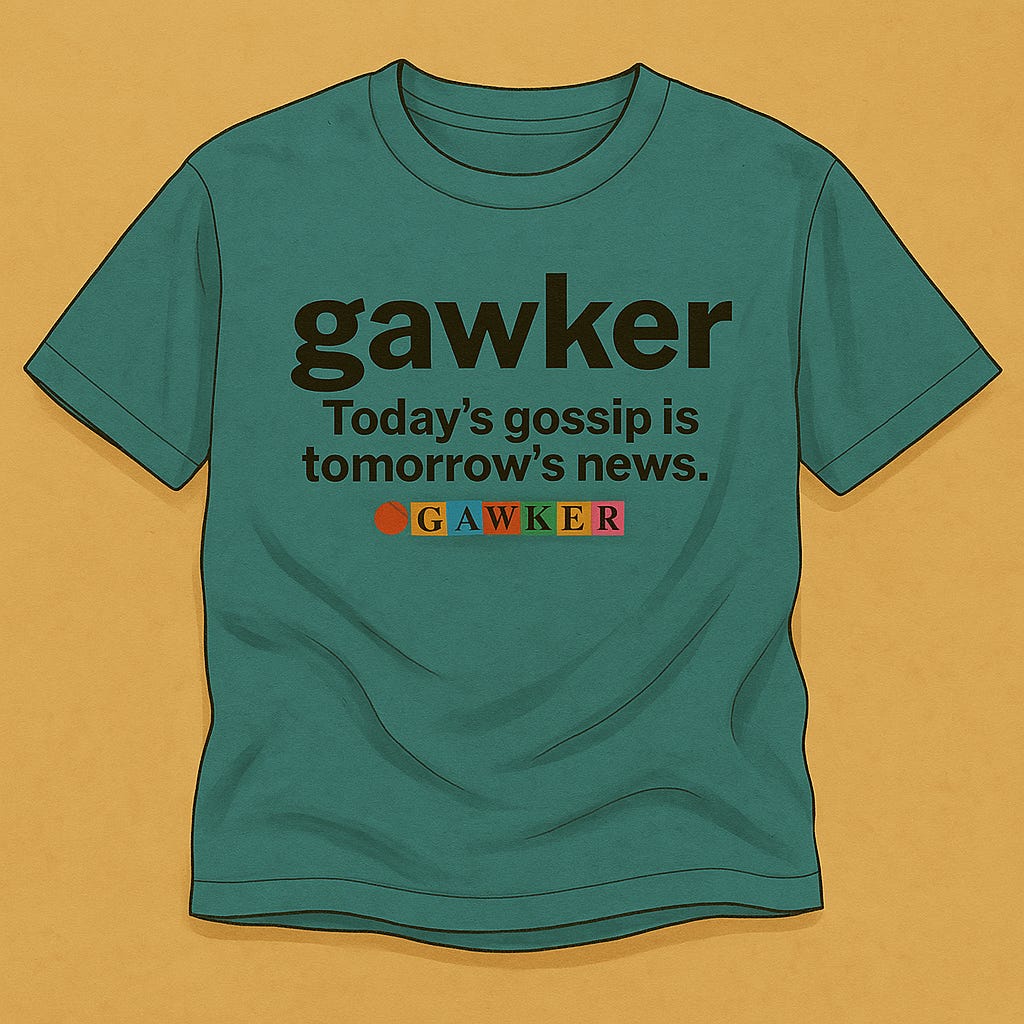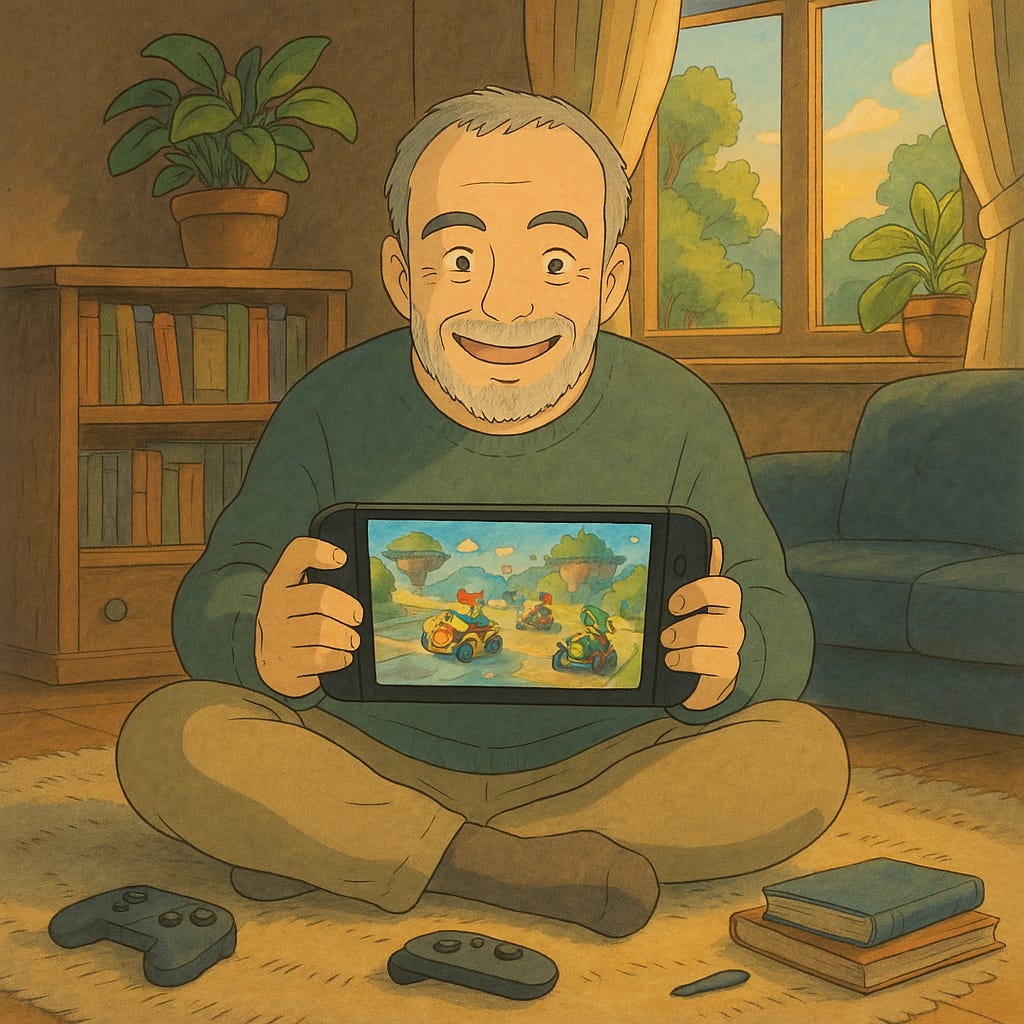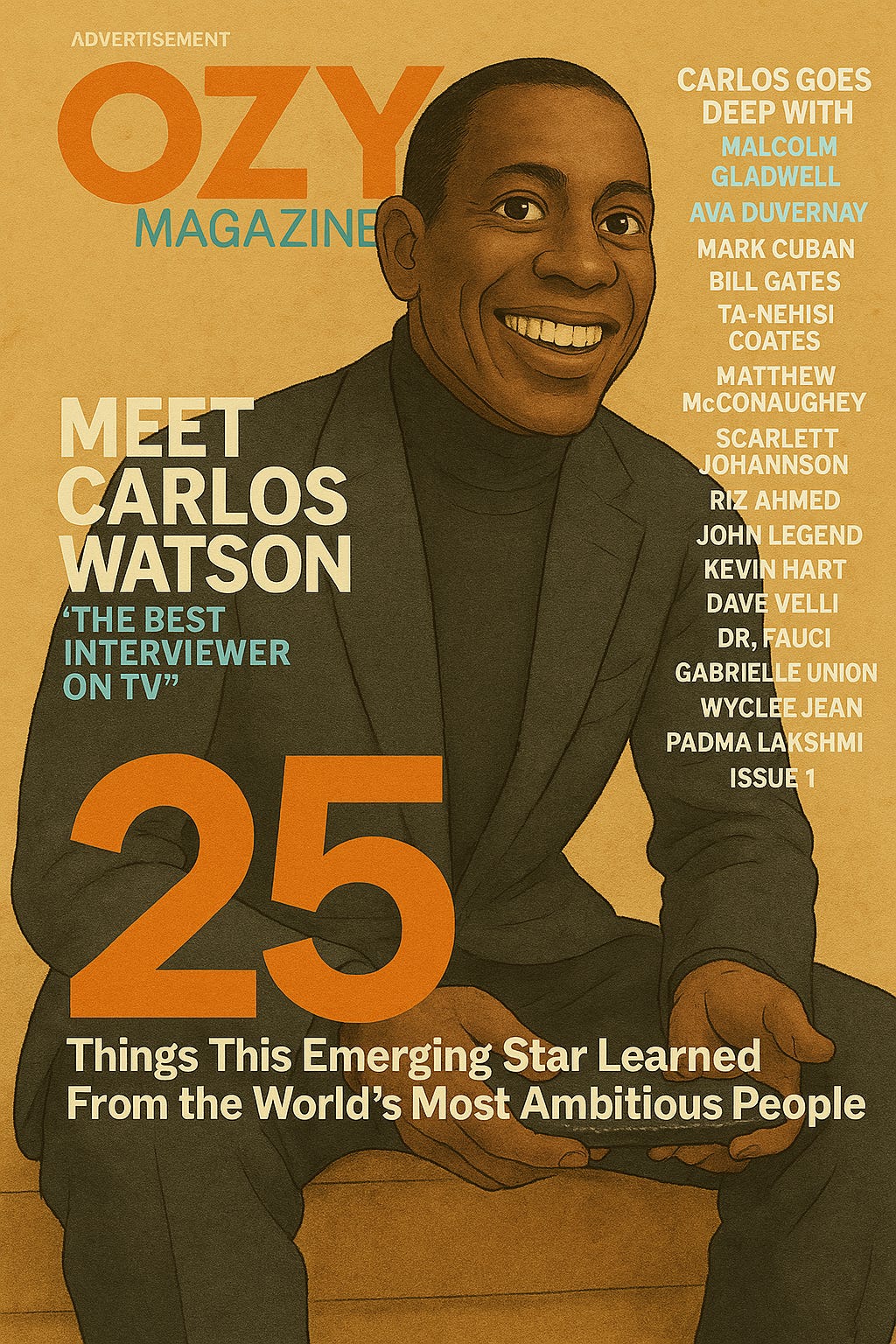The Ultimate Media Business Model
Nick Denton reemerges to discuss the greatest story of our lifetimes. And how to profit from it.
POD: Media, narratives, markets with Nick Denton, EP 128. Gawker Media founder Nick Denton joins the show to discuss how narratives and memes run the world, and why it’s better to trade on them than run the old media playbook of the attention economy. Apple | Spotify | other podcast platforms. Watch PvA on YouTube. Out every Friday AM.
Too long… Read in the browser.
PVA CONVERSATION
Nick doesn’t want to talk about media
TROY: I know Nick Denton is doing heavy rounds right now, but I really wanted to have him on the podcast. I met Nick years ago through a couple of execs at Hearst who had great admiration for what he had built at Gawker Media. I too looked at the Gawker machine with envy. Remember, these were different times. Everyone was trying to figure out what the model was gonna look like post print.
Nick moved effortlessly between content and systems. He built a better machine:
A rabid, high-metabolism editorial team (good until it wasn’t) who understood the distribution mechanics of digital media;
Supported by an analytical system that drip-fed motivational performance data and resulted in piles of page views;
The right balance of monetization that tilted the experience towards the consumer, not the advertiser. Pioneering efforts in affiliate monetization;
A single, functional, efficient content system and templated front end that streamlined delivery across a portfolio of brands;
Kinja, a homegrown commenting platform with social ambitions, boosting community and easing the load on paid content teams.
Gawker brands (Gawker, Lifehacker, Gizmodo, Jezebel, Jalopnik, Kotaku…) were buzzworthy— they had traffic, influence and profit when others were blinded by a scale investment thesis that burned cash. Gawker didn’t grovel with the ad world to get there. Plenty to admire.

Nick loved to talk about Kinja. He maintained the community and discussion were more important than the “media.” Harnessing conversations around the content meant reduced reliance on fickle social distribution, improved audience economics, promising a bit of leverage in what had become a total treadmill business. Every serious digital player — BuzzFeed’s Jonah Peretti included — has chased an elusive sweet spot where content meets platform economics.
Kinja was complicated and expensive. The conversation had moved to social. Even if Nick was inching closer to figuring out something that no other media company had cracked, it didn’t matter. His beloved machine was about to self immolate.
Peter Thiel had found an opportunity to force Denton to repent for Gawker’s sins. In 2013 Terry Gene Bollea, known professionally as Hulk Hogan, brought a Thiel backed lawsuit against the company which would ultimately force it into bankruptcy. I don’t need to get into the details. Start here if you are interested.
I admire how Nick has come to contextualize that moment as somewhat emancipatory. The Hogan suit gave him cover to walk away and watch digital media melt down from the sidelines. Better yet, ignore it altogether. And walk with a bit of cash. Which is where the media narrative gets more interesting.
He says he doesn’t really care about media anymore. I contend he just doesn’t care about that particular manifestation of what now seems like an unwinnable game. He’s clearly riveted by the narrative of this particular global moment and, more importantly, keenly interested in how to profit from it. Short Tesla and Apple, long BYD, Xiomi and China. As Nick tells us on the pod, “There’s no real difference between media and investing, if you understand how stories move people, you understand how they move markets.”
I was looking for answers to the media question. In refusing to indulge us, Nick was answering the question with a slight of hand. Media is everything now. Everything is a story. Stories are valuable. Change the way you think about how you monetize information.
Stepping back from our discussion, it reminded me of the importance of participation as the ultimate metric in media for ever more. Maybe it was always so. Participants care. They discuss and co-create and play. They evangelize. They transact… And they invest. Participation means the audience takes a stake in outcomes. Like sports betting, meme stocks, prediction markets.
The best new media businesses nail this. I suspect we will see more media / market hybrids. Prediction markets, Polymarket and Metaculus, are next generation variants — we don’t call them “media” yet, but that will change. Betting outcomes fused with content is the final manifestation of a fully interactive information space. It’s what the world looks like when kids weaned on YouTube, Discord, Fortnight, crypto and DraftKings embrace the media world as their immersive gaming console. Make the meme. Trade the meme.
Or consider how AI is reshaping media through a participatory lens. AI gives you what you want the way you want it. The media experience is fully personalized, the reader an active participant. New participatory media models will emerge around it. Nick sees AI assisted scenario planning as a powerful new media type and tool to understand emerging narratives.
Perhaps he saw the future before the Gawker experiment was derailed. At least now Nick can use what he learned to bet on what happens next.
Brian, Alex…good to get your take here.
BRIAN: My take on the conversation centered on how Nick’s moved on from the media business because the real leverage is in narratives that drive markets. Journalism as a practice – uncovering secrets and predicting how narratives will unfold – is better used in service of derivatives trading than creating inventory for ad exchanges.
Kinja was born at a time when it was at least plausible that media brands could create their own participatory venues. Nick is saying the action and influence has moved to individuals on to X and prediction markets, where you can stress test narratives and memes. Here’s how I put it: “In the Information Space, of course you’re talking your book because everyone is talking their books, all the time. Through this lens, All-In makes a lot more sense.”
He isn’t shorting Tesla because of its balance sheets per se. He’s shorting the Tesla narrative. He sees belief collapsing, even if the Cybertruck is pretty cool. And belief, in this framework, is the most valuable commodity. Tesla is a story. America is a story. The next great fortune won’t come from publishing a scoop that will make Chartbeat go brrr. It’ll come from being early to a story that moves markets.”
BTW, since we’re talking our own books in the Information Space, The Rebooting has a participatory Online Forum coming up on April 23 about email newsletter personalization.
ALEX: If you want to look into existing media participation I really recommend looking at a lot of these internet-first creators and how audience participation is integrated. Feels very natural to them because they grew up and sometimes started on platforms like Twitch. Half of people like Hassan’s content is him responding to “chat”, Coffeezilla is constantly referencing comments from his community. Artists like Deadmau5, T-Pain, Kenny Beats stream with smaller groups of fans who sometimes stick around for hours.
It’s all now happening via Discord, Patreon, TikTok and a collection of other tools that offer participation and closeness with the creators at a premium tier. Most of these otherwise free/ad supported shows have a subset of fans that are paying for access, the odd extra content, and the satisfaction to know you’re participating in something you love. So isn’t participatory media already well established and popular? Maybe it’s because this stuff sits under the radar, the audience is small (but valuable), or that these media personalities and their activities don’t get much attention in grown-up media. Maybe I’m being naive.
Apropos of nothing, Nintendo announced the Switch 2 today. It’ll start at $449 which is a bit more expensive than their competition. Shows huge confidence in their IP and market position. This price point, higher than the original Switch's $299 launch even adjusted for inflation.

Equally significant is Nintendo's move to price premium games at $80-90 (from $60-70 today), addressing a long-standing issue where game pricing hasn't kept pace with rising development costs. While this increase might seem steep, games remain cheaper than they were in early console days when adjusted for inflation. Cost of development grew exponentially but product price remained the same or got lower.
This adjustment could ultimately benefit the entire industry by creating more sustainable economics for AAA development, providing a wider pricing range for indies, and potentially reducing reliance on microtransactions. Maybe I’m being naive again.
In gaming Nintendo is the Netflix, which means they can be the ones that raise prices first. We all expected it to happen this year from either them or Take 2 releasing GTA 6 which some have said could launch for $100.
ANONYMOUS BANKER
Trump World
This week’s business news was another reminder that we live in Trump World, a place where hype, spectacle, and narrative often outweigh fundamentals.
Newsmax IPO: Newsmax went public this week under the ticker NMAX, and the stock went parabolic, surging 735% on the first trading day and peaking at $265 before crashing back to $56 per share by Wednesday. At its high, Newsmax was worth over $28 billion (more than Fox Corp.) despite being unprofitable, subscale, and lacking meaningful growth prospects. The rally was pure meme-stock energy, driven by retail investor enthusiasm among its core conservative audience. But the fundamentals never supported the frenzy and most pre-IPO investors and employees are still holding restricted shares they can’t sell, meaning very few profited.
Carlos Watson’s Pardon: Ozy Media founder Carlos Watson received a pardon as he was en route to prison. Bill Cohan at Puck has the full story, plus a great throwback article about a past run-in with Watson and his PR team as everything was crumbling. Carlos Watson got in trouble for orchestrating a scheme to deceive investors by inflating Ozy Media’s financials and audience metrics, including staging an investor call with a fake YouTube executive. With AI tools, this type of fraud is poised to become even more rampant and harder to detect, companies can now easily fake user traction, financials, and even create synthetic executives with minimal effort. The bar for diligence is going to get much higher, likely opening up an entirely new category of agentic bots for diligence that double-verify every claim and data point provided.

Trouble at The Daily Wire: A lot of people asked me about this news leak on the Daily Wire. According to several tweets, The Daily Wire is undergoing internal upheaval. While the core podcast business remains strong: large audiences, solid ad revenue, and committed sub-base, the company appears to have overextended on big-budget video projects that haven’t translated into subscriber growth. Many of their films are bingeable in a single month, offering little incentive for long-term retention. Restructuring and staff exits are reportedly already underway.





Bless Nick but a POV wholly emerging from a more feathered nested than the rarified cloisters of Oxbridge PPE is hard to imagine - FFS he even managed to diss and dismiss the Celts as rednecks a full 1,000 years after his mob brute forced their Norman norms onto the ancient Briton landscape. Talk about an adrift media still determinedly waxing confident in a tsunami-esque unchartered medium. There's an old saw that you can never fully understand a culture you were not born in to - and that seems apposite with many a present media head applying their linear fixed text ideas in a wholly fluid dynamic information world. Hey who knows maybe somewhere out there there is another orthogonal view spewing Brit who quietly bought a shed load of bitcoin 12 years ago and has hung into it so feels no need to bang on on Short Long or anything else and has original ways of looking at the world?? - (and Yes we Brits consider one another absolute fair game to intellectually toss and gore each other)